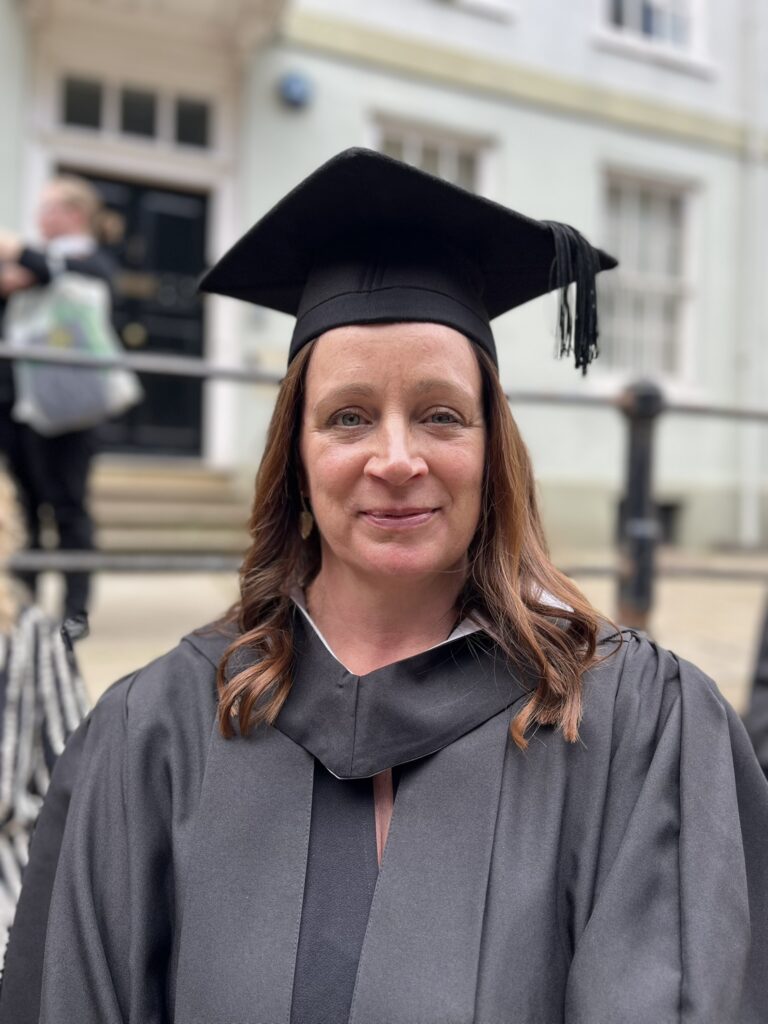El Lee reflects on her time studying the FdA Early Years and shares her top tips for new students.

Prior to enrolling on the FdA Early Years, I was (and still am) a Teaching Assistant in a Worcestershire primary school. I class myself as a mature student as I started my teaching degree some 25 years ago but never completed it. This has been my biggest regret and over the years I have wanted to complete what I started, so here I am!
I also wanted to show to friends, family and children alike, that you can do anything you want to do, as long as you have the desire, and determination to do so.
It is fair to say that it has not been a breeze and in my ‘mature’ years, juggling full-time work with family – and daughters who have been through milestone moments themselves and needing to be ferried to every possible football match and training session invented – has meant many late nights and studying at random times in the week. Close family and friends have been there through it all with me and I am chuffed they have been part of the heady highs and lonely lows and were able to celebrate my graduation with me.
Going forward, I am now enrolled on the BA(Hons) Integrated Working with children and Families Top-Up with a view to completing my final step to becoming a teacher by completing my PGCE. One thing I do know is that the next two years will fly by, just as quickly as the last two.
My developing understanding on children and education is about to explode once more for the better and I cannot wait to be able to put my newly found learning into practice. If you had have asked me two years ago if I could reflect and develop on my own ideas of children and their environments, the contemporary concepts of others, or include educational research into my own work, I would have gulped and nervously laughed at you. But guess what, I, and my fabulous course friends were able to do just that through the support of the fantastic tutors.
As for advice on those enrolling, keep it simple:
1 Get organised, as quickly as possible. Get into a pattern of when you can fit the reading and study time into your week, that suits you and all of the other priorities in your life – and stick to it!
2 Read – this is not every book at once that you find on a reading list but stick to the theme you are working on at that time. Use the library services, they are great.
3 Make notes on interesting points read – and for you to add these into your future writing, you will need to know where that quote came from…so
4 Make sure you reference your interesting points found. For me, using a referencing tool such as MyBib allowed me to quickly confirm that interesting point and put it into useful categories I could go back to later. This saves hours and is invaluable when you are trying to write your assignments.
5 Love your free time – and make sure you find time to have some fun, which is easier said than done, but it is essential!
6 Use friends and peers as a soundboard – ask questions to as many relevant people as possible to get another perspective on a subject or question. It can be easy to think that you know the best answer to a question but guess what, this is not always the case. Be confident to ask for help, it’ll save you hours in the long run, I promise!
7 Be proud! You are amazing for taking the bold step in wanting to better your future prospects, it is not easy (guess what, it’s not supposed to be!) but you will be super chuffed once you get your grades at the end and get to celebrate your success at your graduation!
If you’re interested in finding out more about the FdA Early Years (0-8 years) (HTQ), contact Course Leader, Samantha Sutton-Tsang: s.sutton-tsang@worc.ac.uk
If you would like to know more about the BA(Hons) Integrated Working with Children and Families, contact Course Leader, Angela Hodgkins, a.hodgkins@worc.ac.uk
